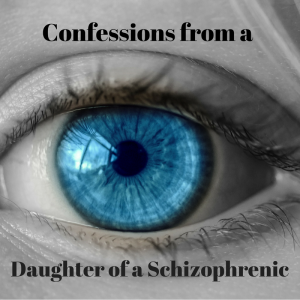 by Karen Sargent
by Karen Sargent
Not a single photo exists of my father and me. He had just turned 27 when I was born, but during my mom’s pregnancy, mental illness had clutched him so quickly and so deeply that his eyes, his face, could no longer hide it. My father’s illness at my birth and in the months following were not memories my mom wanted to keep so—no pictures.
That was in the ‘60s when schizophrenia was a complete mystery and the stigma of mental illness was even more isolating than today. My mom didn’t understand what was happening, and her in-laws lived in denial, leaving her to cope alone.
When it was time for my arrival, my father was AWOL. Mom called a friend to take her to the hospital, stopping along the way to leave my two-year-old brother with our grandma. A few days later my mom returned home with a newborn and a toddler—a toddler who my father began to insist was a little person impersonating his young son. His mental illness escalated, and so did my mother’s fear for the safety of her son.
I remember a story she told about bundling my brother on a harsh Chicago winter evening and pushing him in a stroller two blocks to the store to buy formula. She had fed and changed me and was certain I was asleep before leaving me with my father, who was always gentle with me. But leaving my brother with him was out of the question. As she pushed through snow-covered sidewalks and blistering wind, a woman approached, glanced inside the stroller, and hissed, “You should be ashamed of yourself.” My mom didn’t respond aloud but inside she said, “Lady, if you only knew.”
I was 16-months-old when my father took his life and my mom moved us to another state. She never hid the truth from me—about my father’s illness or his death—so I grew up knowing I was the daughter of a schizophrenic and wondering if the disease would target me, too.
As a teenager, I developed a fascination with schizophrenia. When teen drama took the stage, I wondered if girls were really talking about me, or if I was being paranoid. If I was paranoid, was it normal paranoia or was it my father’s paranoia? How would I know? And I was a daydreamer, but was I really? What separated a daydream from a hallucination? I worried I wouldn’t know the difference. I marked each birthday as another year I had successfully evaded the disease, and when I finally made it through my teens, through my twenties, and into the next decade, I relaxed because I knew the research. I was 30. I should be safe.
But then I had children…and new questions. Could schizophrenia skip a generation? What does it mean that my daughters are “genetically predisposed” really? Could some trigger set off the illness? What could be the trigger and how could we avoid it?
I discovered my daughters’ chances of inheriting the disease were higher than the general population—but only slightly. And since parenting presents daily challenges in the here and now, I decided not to waste energy on what ifs. I tucked away my fear, but still I find myself gauging my daughters’ behavior, their emotional reactions, their ability to cope.
One morning I realized I wasn’t the only one with genetics on her mind.
“Mom?” My 15-year-old daughter sat with her phone in her lap as I drove us to school. “Do you think I think weird things? You know, not like normal people think?”
She was digging for something, but I wasn’t sure what. “You don’t think weird things, but you do think differently than a lot of people. That’s the creative, artsy part of you.” I glanced at her. She seemed satisfied.
After a few white lines on the highway passed by, her next question came. “When you think about things, you know, in your head, is it like a voice, like you hear your voice or maybe other people’s voices?”
“You mean if I think about a conversation I had with Dad, do I hear our voices?”
She nodded.
“Sure.”
She glanced at her phone, touched the screen to scroll down, and then looked out the window a few seconds. When she spoke, I heard the forced nonchalance in her voice. “Sometimes I think people are talking about me, like, at school and stuff. Do you think I’m paranoid?”
The destination of our conversation was suddenly revealed, but we were taking an indirect route via a list of symptoms I assume was displayed on her phone. I smiled. “Honey, you are in high school. People probably are talking about you. That’s not paranoia. That’s drama. Sweetie—”
She turned toward me. I took my eyes off the road long enough to look hard into hers.
“You don’t have schizophrenia.” I smiled, a little amused, a little sad.
“How do you know?” I heard the hope more than the question.
“Because I know. I used to worry, too, when I was your age. And all that worrying was for nothing.”
She clicked a button on her phone and the screen went black. “Good.” She settled into her seat and her shoulders relaxed.
But mine didn’t. I wondered if she knew about 30. I wondered if she’d check off each year she celebrated a birthday as I did, like it’s a rush to the finish line. She may not. But I will.
 AUTHOR BIO
AUTHOR BIO
Karen Sargent used to believe that being an English teacher and a mother interfered with her dream to become an author. After more than two decades in the classroom and 21 years of momhood, she now realizes teaching her students great literature and how to write made her to a storyteller and a better writer. Raising two daughters gave her something meaningful to write about. Karen is the author of Waiting for Butterflies, an inspirational women’s fiction novel, and she blogs at The MOM Journey…where moms aren’t perfect and that’s perfectly okay. She and her husband are preparing for their nest to be empty when their youngest daughter joins her sister at college in the fall. Visit Karen at www.karensargentbooks.com or on The MOM Journey at www.karensargentbooks.com/blog/.






Ralene, thank you so much for the opportunity to post on your confessions blog. I apologize for being so late in commenting. I’ve been traveling without a laptop, and I couldn’t access the comments section on my phone. Blessings!
Ralene, thank you for inviting me to guest post a confession. I apologize that I have not interacted sooner. I’ve been traveling without a laptop and couldn’t access the comment section from my phone. Blessings!